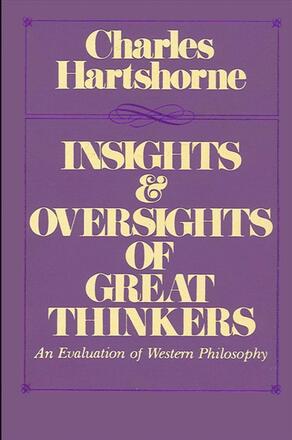
Insights and Oversights of Great Thinkers
An Evaluation of Western Philosophy
Alternative formats available from:
Description
One learns a great deal about a major philosopher by coming to appreciate his perspective on the history of philosophy. Here Charles Hartshorne gives us just such a perspective on the history of philosophy and thereby on himself. This is a reexamination of the history of philosophy, looking at neglected aspects of the philosophers' thought, interpreting their views in a sharply focused, controversial manner in order to show the origins and development within the Western tradition of the metaphysical and moral views represented by process philosophy. The result is a fresh look at the tradition.
This is a clearly written, readable, original, and constructive interpretation of the history of philosophy in hte West from the sixth century before Christ to the present. As the best-known living representative of process philosophy, Hartshorne shows that it has anticipations in Plato, Aristotle, Leibniz, Hegel, Schelling, and many others, even including the materialist Epicurus and the atheist Nietzsche. Process philosophy and theology have significant overlap with the views of most of the creative, constructive philosophers and theologians of recent times, including Peirce, William James, Bergson, Heidegger, Paul Weiss, Berdyaev, John Findlay, Paul Tillich, Sartre, Merleau-Ponty, and others. This philosophy takes creative freedom, transcending causal determinism, and a generalized idea of sympathy—"feeling of feeling," love—as universal principles of life and nature.
Charles Hartshorne's life and thought span more than eight decades. Ashbel Smith Professor Emeritus of Philosophy at the University of Texas as Austin, he has made a vast contribution to the literature of philosophy and theology. He is most notably the author of Whitehead's Philosophy, Creative Synthesis and Philosophic Method, A Natural Theology for Our Time, The Logic of Perfection and Other Essays in Neoclassical Metaphysics, and numerous other books and articles. Dr. Hartshorne is also a past president of the Western Division of the American Philosophical Association, the Metaphysics Society of America, the Charles Peirce Society, the Society for Philosophy of Religion, and the Southern Society for Philosophy and Psychology.